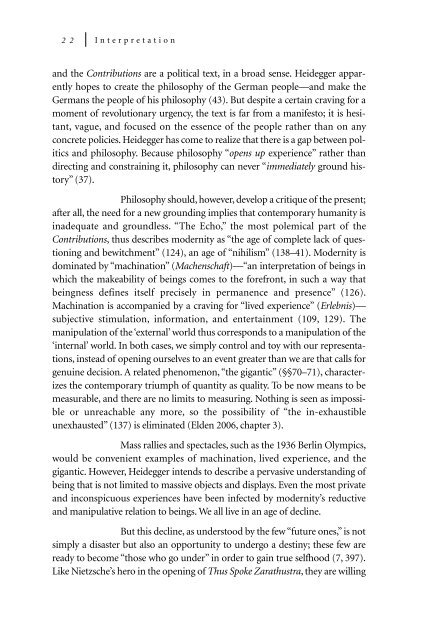Beyond Struggle and Power: Heidegger's Secret ... - Interpretation
Beyond Struggle and Power: Heidegger's Secret ... - Interpretation
Beyond Struggle and Power: Heidegger's Secret ... - Interpretation
Create successful ePaper yourself
Turn your PDF publications into a flip-book with our unique Google optimized e-Paper software.
2 2 <strong>Interpretation</strong><br />
<strong>and</strong> the Contributions are a political text, in a broad sense. Heidegger apparently<br />
hopes to create the philosophy of the German people—<strong>and</strong> make the<br />
Germans the people of his philosophy (43). But despite a certain craving for a<br />
moment of revolutionary urgency, the text is far from a manifesto; it is hesitant,<br />
vague, <strong>and</strong> focused on the essence of the people rather than on any<br />
concrete policies. Heidegger has come to realize that there is a gap between politics<br />
<strong>and</strong> philosophy. Because philosophy “opens up experience” rather than<br />
directing <strong>and</strong> constraining it, philosophy can never “immediately ground history”<br />
(37).<br />
Philosophy should, however, develop a critique of the present;<br />
after all, the need for a new grounding implies that contemporary humanity is<br />
inadequate <strong>and</strong> groundless. “The Echo,” the most polemical part of the<br />
Contributions, thus describes modernity as “the age of complete lack of questioning<br />
<strong>and</strong> bewitchment” (124), an age of “nihilism” (138–41). Modernity is<br />
dominated by “machination” (Machenschaft)—“an interpretation of beings in<br />
which the makeability of beings comes to the forefront, in such a way that<br />
beingness defines itself precisely in permanence <strong>and</strong> presence” (126).<br />
Machination is accompanied by a craving for “lived experience” (Erlebnis)—<br />
subjective stimulation, information, <strong>and</strong> entertainment (109, 129). The<br />
manipulation of the ‘external’ world thus corresponds to a manipulation of the<br />
‘internal’ world. In both cases, we simply control <strong>and</strong> toy with our representations,<br />
instead of opening ourselves to an event greater than we are that calls for<br />
genuine decision. A related phenomenon, “the gigantic” (§§70–71), characterizes<br />
the contemporary triumph of quantity as quality. To be now means to be<br />
measurable, <strong>and</strong> there are no limits to measuring. Nothing is seen as impossible<br />
or unreachable any more, so the possibility of “the in-exhaustible<br />
unexhausted” (137) is eliminated (Elden 2006, chapter 3).<br />
Mass rallies <strong>and</strong> spectacles, such as the 1936 Berlin Olympics,<br />
would be convenient examples of machination, lived experience, <strong>and</strong> the<br />
gigantic. However, Heidegger intends to describe a pervasive underst<strong>and</strong>ing of<br />
being that is not limited to massive objects <strong>and</strong> displays. Even the most private<br />
<strong>and</strong> inconspicuous experiences have been infected by modernity’s reductive<br />
<strong>and</strong> manipulative relation to beings. We all live in an age of decline.<br />
But this decline, as understood by the few “future ones,” is not<br />
simply a disaster but also an opportunity to undergo a destiny; these few are<br />
ready to become “those who go under” in order to gain true selfhood (7, 397).<br />
Like Nietzsche’s hero in the opening of Thus Spoke Zarathustra, they are willing
















